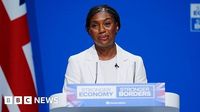As the Conservative Party conference drew to a close in Manchester this week, party leader Kemi Badenoch stood at the center of a political storm—both inside and outside the conference hall. Facing a party still reeling from its 2024 general election defeat and languishing in the polls behind Labour and Reform UK, Badenoch used her first conference as Conservative leader to set out a bold new economic vision, defend her leadership, and attempt to rekindle party morale.
It was a four-day affair marked by empty seats in the main hall, a fact not lost on observers or the media. Yet Badenoch was quick to dismiss concerns about flagging enthusiasm. According to the BBC, she insisted, "Everyone is telling me about the buzz they can feel—they can see everything is coming back together and we can do this." She attributed the sparse attendance in the main hall to the party’s new status as the opposition, noting, "We used to be teeming with corporate lobbyists, now we are teeming with party members." Popular sessions, she argued, were happening at fringe events, where attendees reportedly queued to get in.
Badenoch’s optimism was palpable. She described a party energized by its new direction, recalling a night spent singing "Sweet Caroline" with young Conservatives. "This is one of the first conferences I've been to where it has really felt like the members owned it, and I'm really proud of that," she told the BBC.
But beneath the upbeat rhetoric, the party’s challenges were inescapable. Since the 2024 defeat, the Conservatives have struggled to regain traction, suffering further setbacks in the 2025 local elections and trailing their rivals in national polls. Reform UK, led by Nigel Farage, has capitalized on the Conservative malaise, using the conference’s third day to announce a string of councillor defections. The Tories’ slow pace in unveiling new policies has drawn criticism from within, with some suggesting it has created a vacuum that Reform UK has eagerly filled.
Against this backdrop, Badenoch sought to reassert her party’s claim to economic competence—a mantle battered by memories of Liz Truss’s ill-fated 2022 mini-budget. In her keynote address, she unveiled a new economic "golden rule" designed to cut government borrowing and taxes. "It starts with fiscal responsibility," she declared. "We have to get the deficit down and we must also show how every tax cut or spending increase is paid for." The rule is simple: half of all savings made by a future Conservative government would be used to reduce the deficit, while the other half would fund policies to stimulate economic growth, including tax cuts.
The party’s pledges were ambitious. Conservatives committed to saving £47 billion a year through cuts to welfare, the civil service, and foreign aid. They also promised £9 billion in new spending, including a £5,000 tax rebate for young people and the abolition of business rates for High Street shops. In a nod to the party’s traditional base, Badenoch also confirmed policies to leave the European Convention on Human Rights and to deport 150,000 people annually—a move designed to underline the party’s commitment to "stronger borders" as well as a stronger economy.
On education, Badenoch proposed a controversial plan to double the apprenticeship budget by reducing student numbers by 100,000 a year. She explained, "So we will shut down these rip-off courses and use the money to double the apprenticeship budget, giving thousands more young people the chance of a proper start in life." The savings from cutting student numbers—estimated at £3 billion—would be redirected entirely to support apprenticeships, with caps on all subject areas and further reductions for courses deemed to offer poor graduate prospects.
Badenoch’s economic messaging echoed that of previous Conservative governments, particularly the deficit-cutting language of former Chancellor George Osborne. The party’s new direction harks back to the coalition years, when reducing the deficit was the central mission. The Office for Budget Responsibility’s latest forecast suggests public sector net borrowing will fall from £137.3 billion (4.8% of GDP) this year to £74 billion (2.1% of GDP) by 2029-30. Yet Badenoch and her allies remain skeptical of Labour’s ability to achieve similar results, accusing Chancellor Rachel Reeves of presiding over a "borrowing and tax doom loop." Badenoch warned, "It is stealing from our children and grandchildren. And Conservatives will put a stop to it."
Labour, for its part, was quick to hit back. A party spokesperson said, "Kemi Badenoch has some brass neck. It’s astounding that her latest speech still contains no apology for the Conservatives crashing the economy, which left families saddled with sky-high mortgages and rising prices in the supermarket." Labour dismissed the Conservatives’ savings plans as "fantasy," likening their calculations to those of Reform UK leader Nigel Farage, and accused the Tories of being "all over the place" and untrustworthy with public finances.
The Liberal Democrats also weighed in, ridiculing the idea that the public would trust the Conservatives to manage the economy after years of turbulence. "From almost crashing our economy to leaving public services on their knees, the Conservatives have shown their economics is almost as bad as their spelling," a spokesperson quipped, referencing a conference gaffe where chocolate bars were distributed with a misspelt slogan: "When Labour negotiates, Britian loses," as reported by The Sun.
Meanwhile, the Conservatives have not shied away from attacking their rivals. They branded Reform UK "socialist" for its promises to increase spending and nationalize industries, despite Reform’s own pledges to make savings to fund tax cuts and boost the NHS and defense. The Tories’ rhetoric reflects a party eager to draw sharp contrasts with both the government and insurgent parties, even as it battles to regain its own footing.
Despite the skepticism and the party’s troubles, Badenoch remained defiant about her leadership and the Tories’ prospects. "I'm not losing. I'm going to be winning," she told the BBC ahead of her speech. She acknowledged that her approach—more deliberative and policy-focused than headline-grabbing—might come with a "small political price" in the short term but insisted it would pay dividends in the long run.
As the conference ended, the mood among Conservatives was a mixture of determination, nostalgia, and cautious hope. The party’s path back to power remains steep, but under Badenoch’s stewardship, the Tories are betting that fiscal discipline, bold policy shifts, and a renewed sense of purpose can eventually win back both their base and the wider public.





